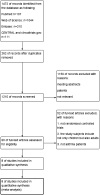Probiotics for children with asthma: a systematic review and meta-analysis
- PMID: 40342899
- PMCID: PMC12058802
- DOI: 10.3389/fped.2025.1577152
Probiotics for children with asthma: a systematic review and meta-analysis
Abstract
Background: Asthma is a common chronic inflammatory disease affecting children worldwide. While probiotics have been proposed as a potential therapy, their efficacy in pediatric asthma management remains controversial.
Methods: A systematic search of PubMed, Web of Science, Embase, Cochrane Central Register of Controlled Trials (CENTRAL) and clinicaltrials.gov was conducted to identify randomized controlled trials (RCTs) from 2014 to 2024 evaluating probiotic interventions in children with asthma. Primary outcomes included asthma exacerbation rates and predicted FEV1%. The risk of bias was assessed using Cochrane guidelines.
Results: Out of 1,361 articles, eight RCTs involving 902 participants were included. Meta-analysis showed probiotics significantly reduced acute asthma episodes with risk ratio of 0.38 (95% CI: 0.26-0.56, p < 0.00001) and improved FEV1/FVC ratios (MD = 5.70, 95% CI: 1.93-9.47, p < 0.003) compared to the control group. Neither FEV1 levels nor school attendance showed significant changes.
Conclusion: Probiotic supplementation may reduce asthma exacerbations and improve pulmonary function in pediatric asthma. However, heterogeneity across studies suggests the need for further research to determine optimal strains, dosages, and treatment durations. This review establishes groundwork for research and practice by exploring microbial interventions in childhood airway disorders.
Systematic review registration: https://www.crd.york.ac.uk/PROSPERO/view/CRD42024607569, identifier (CRD42024607569).
Keywords: asthma; children; meta-analysis; probiotics; pulmonary function.
© 2025 Liu, Zhang, Li, Zhang, Xie and Liu.
Conflict of interest statement
The authors declare that the research was conducted in the absence of any commercial or financial relationships that could be construed as a potential conflict of interest.
Figures




References
-
- Vos T, Lim SS, Abbafati C, Abbas KM, Abbasi M, Abbasifard M, et al. Global burden of 369 diseases and injuries in 204 countries and territories, 1990–2019: a systematic analysis for the global burden of disease study 2019. Lancet (London, England). (2020) 396(10258):1204–22. 10.1016/S0140-6736(20)30925-9 - DOI - PMC - PubMed
Publication types
LinkOut - more resources
Full Text Sources

